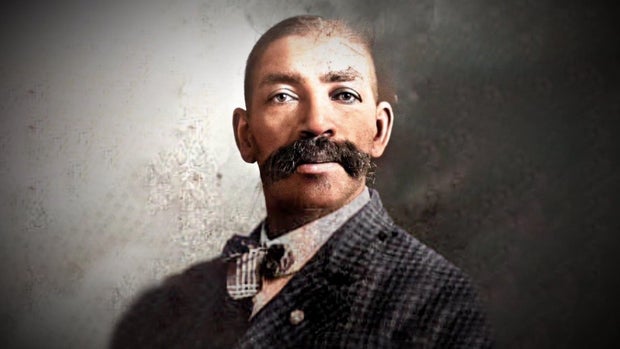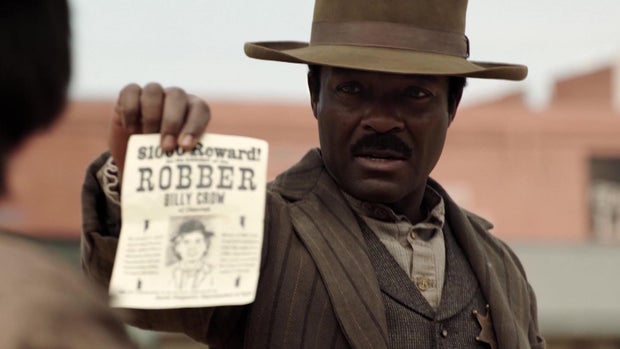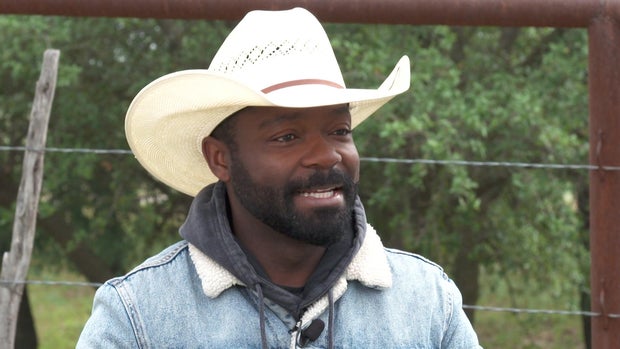In the lore of the American West, where heroes are made of both lawmen and the lawless, there's a story of a man as tough as Billy the Kid, as good with a gun as Wild Bill Hickok, and as fast as a horse on the Pony Express. At 6 foot two, Deputy U.S. Marshal Bass Reeves was as imposing as his mustache. So strong, it was said if he spit on a brick, it would shatter.
"He was like the Michael Jordan of frontier lawmen," said biographer Art Burton. "He could whip any two men with his bare hands."
Reeves roamed the heart of the Indian and Oklahoma Territories almost with impunity – a nightmare for any outlaw, said Burton, an African American Studies expert. "When I was doing the research, I was shaking my head all the time, saying people are not going to believe this," he said.
You'd think a wild west story like that would almost tell itself. But when Burton began rustling up research for a book on Reeves, he kept hitting dead ends, like when he tried to trace the Bass Reeves family tree. "A lady answered the phone, and she said she'd never heard of him," said Burton. "I said, 'Well, he's a African American who was a deputy U.S. marshal.' And she was very kind about it; she says, 'Sir, I'm sorry, we did not keep Black people's history here.'"
Before he was a lawman, Reeves was a fugitive, a runaway slave from Texas. The former slave eventually made a name for himself by arresting white people, no less. And yet his extraordinary story had largely been as forgotten as a ghost town – and Oklahomans say his time has come. One man said, "He's the stuff of legend. I cannot imagine him being white, and having the kind of career he had, and it not be a major motion picture already, maybe several times over."
To actor David Oyelowo, the tale of Bass Reeves has the same ingredients as the Lone Ranger – only better. "It's one thing to be a white guy with a mask, riding a pretty damn wonderful horse," he said. "It's another thing to be doing that with limited resources. You're a Black man coming out of enslavement, and you do it for 30-plus years, and no one is paying you any attention? It sort of feels intentional almost, that we don't know more about him."
Oyelowo talked with "Sunday Morning" this past Spring about trying to correct history's omission, by acting in and executive producing an eight-part series for Paramount+ (CBS' sister network), called "Lawmen: Bass Reeves."
It's a massive production shot mostly on a ranch in Texas with veteran actors like Donald Sutherland and Dennis Quaid.
"It's great to do a Western, man," said Quaid. "It's like being 12 years old again. It really is."
Quaid was equally impressed with Reeves' real-life loyalty to the law: "The thing was that Bass Reeves really was the real deal. He really was that."
Oyelowo said he studied recordings of slave narratives found in the Library of Congress to get his speech patterns just right. He also learned to rope and ride. "I'm always looking for opportunities to scare myself, and that really did it!" he laughed.
He's had his share of insights into the man Reeves must have been. But the role was also a reminder that no matter how long it takes, light always illuminates greatness. "A tenet I live my life by is that excellence is the best weapon against prejudice," said Oyelowo. "He was excellent. It was difficult to just say, 'Oh, that's a Black man who is unworthy, who should be subjugated.' You couldn't dismiss him in that way. And that's also the reason why to not celebrate him is wrong."
Bass Reeves lived to be 71, spending his final years in the frontier town of Muskogee, where, at the Three Rivers Museum, Reeves is still remembered and celebrated every year at the Bass Reeves Western History Conference.
No one knows where Reeves is buried – and maybe that only adds to the mystique.
For Art Burton that doesn't matter; the child in him wants to thank Reeves for giving him – and other Black Americans – a tip of the hat, to a legend all their own.
"I used to always wonder, where were we [in stories of the Old West]?" said Burton. "So it's like, God answered my prayers by giving me somebody, before I passed away, that said, 'Well, we were part of the scene, too.'"
To watch a trailer for "Lawmen: Bass Reeves," click on the video player below.
For more info:
Story produced by David Rothman. Editor: Ed Givnish.
"story" - Google News
November 05, 2023 at 09:33PM
https://ift.tt/IyZuCkE
The story of Deputy U.S. Marshal Bass Reeves, "the Michael Jordan of frontier lawmen" - CBS News
"story" - Google News
https://ift.tt/GZHbvkp
https://ift.tt/GSTLsOZ
Bagikan Berita Ini

















0 Response to "The story of Deputy U.S. Marshal Bass Reeves, "the Michael Jordan of frontier lawmen" - CBS News"
Post a Comment